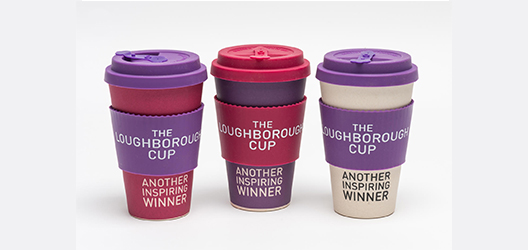5 Jun 2018
Why it’s E-essential to support World Environment Day
Today (Tuesday 5 June) is World Environment Day – the United Nation's most important day for encouraging worldwide awareness and action for the protection of our environment.
To mark the occasion, the Sustainability Team has highlighted four ways staff and students can make a difference on campus and support the University in becoming a sustainable and socially responsible place and one of its waste success stories.
1. Environmental essentials
E-essentials is a short training course recommended for all staff and students; it explains the University’s key areas of sustainability and how these affect the campus.
The online course takes approximately 20 minutes to complete, with a short test at the end to assess your knowledge. More information can be found here.
2. The Loughborough Cup
As part of the University’s initiative to reduce the one million disposable cups used on campus each year, staff and students are advised to use a re-useable cup.
The Sustainability Team will shortly be taking delivery of the latest batch of the Loughborough Cup, which will be available to purchase in most retail outlets on campus.
They cost £7 and the price includes three free hot drinks. The discount on future hot drink purchases is also 10% when using the reuse cup.
More information on the Cups and where discounts and free drinks can be redeemed can be found here.
3. Waste Hierarchy
The waste hierarchy is key to understanding the best solutions to reducing waste. It is important to follow this best practice code and primarily reduce waste where possible, consider reusing or ultimately recycle.
- Reduce; looking for ways of reducing waste in day-to-day activities. Do you really need to print a document?
- Reuse; considering whether resources can be reused before discarding. Are you using more environmentally friendly options such as a reusable cup, water bottle or rechargeable batteries?
- Recycle; ensure materials which can be recycled are segregated avoiding contamination.
4. Food waste
On average, food waste makes up around 25% of all general waste.
There are some ways staff and students can avoid food waste - such as not forgetting about food, ensuring they choose food they like – but sometimes it is unavoidable (e.g. banana skins, apple cores etc).
Food waste collections are currently being trialled in certain academic areas, with a plan to roll out across all of campus soon.
Staff and students are urged to use the collections where possible.
Wolfson success
The Sustainability team is currently running a pilot engagement project with the Wolfson School that aims to educate staff and students on how to efficiently reduce waste and understand more about recycling.
They have carried out activities such as labelling what can and can’t be recycled in the retail outlet, surveying staff and students, playing a recycling game with building users, changing the bin provision and bin emptying regime and are also in the process of introducing food waste segregation.
After understanding the impact of this work, the team hope to continue to roll this out to other Schools and Departments.
Nik Hunt, Loughborough’s Environmental Manager, commented: “The University has come a long way in the last eight years, but there is still so much more we can do to support the University’s strategy of embedding sustainability into our operations and procedures.
“It’s about all of us making small changes and doing our bit. Please consider how you can reduce, reuse, and recycle as part of your daily routine.”
For more information on the work undertaken at the University to tackle waste, visit the Sustainability webpages.















